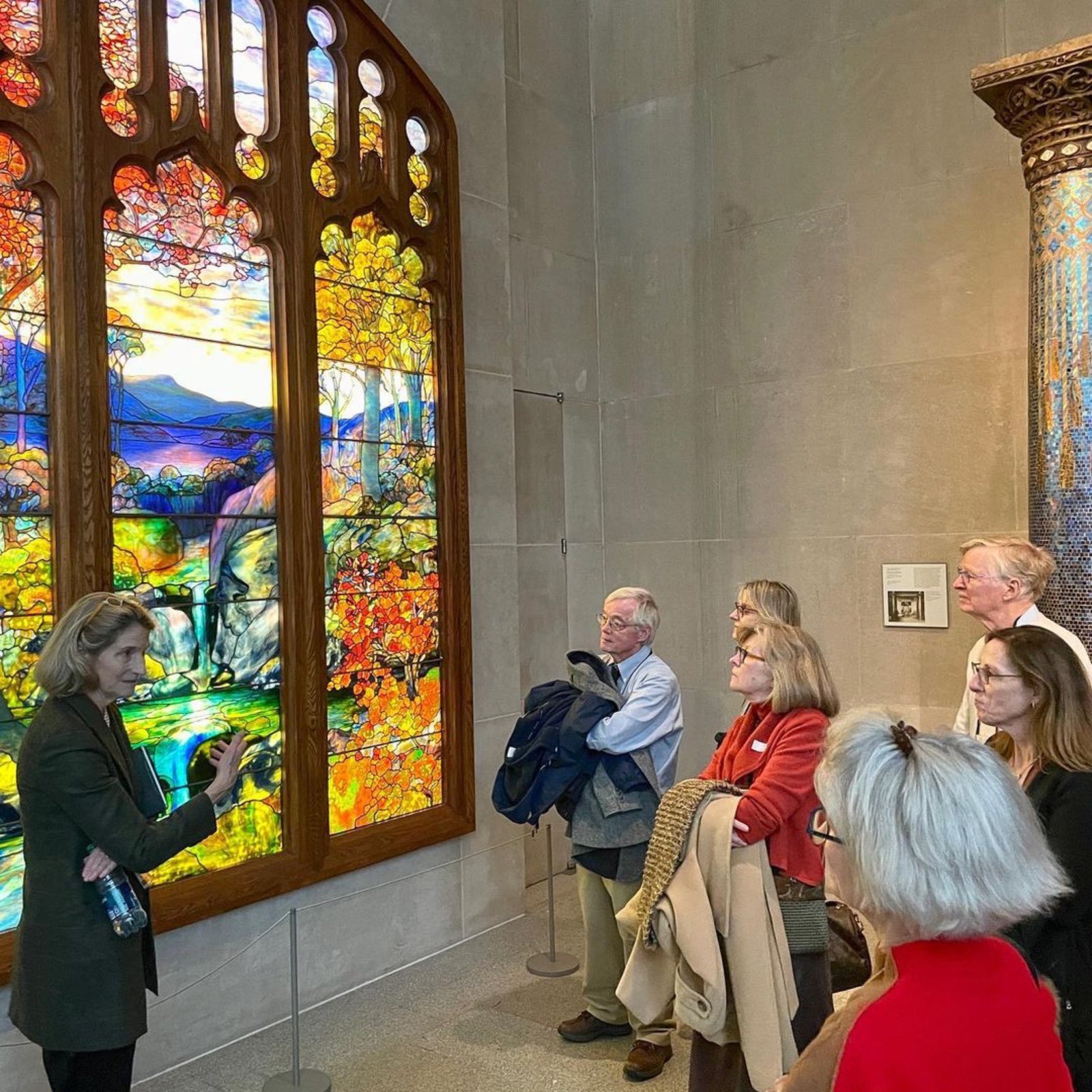Who Are the Tiffany Girls?
Often behind every great man stands a great woman (or several). Such is the case with Louis Comfort Tiffany, son of the jeweler, who is well known for his stained glass in windows and lamps.
Tiffany, while quite innovative in his scientific and artistic achievements regarding glasswork, did not design or make all of the lamps and windows that bear his name. In 1892, he established a glassmaking studio in Corona, Queens, a few blocks from where I live, made up entirely of women in response to a strike by the men’s Lead Glaziers and Glass Cutters Union. These women made a substantial contribution to his work.
“View of the Glass Room, with Women at Work,” from Art Interchange, October 1894
Detail from “Snowball” a window made by an unidentified Tiffany Girl and sold this year at The Winter Show through Lillian Nassau. Photo by Lynn Byrne.
Tiffany started with 6 female employees. The studio so successful that by 1894 it grew to 35. Dubbed the Women’s Glass Cutting Department, the women called themselves the “Tiffany Girls.” Their work included both design was well as implementation. They selected individual pieces from a limitless variety of opalescent sheet glass, cut individual segments from templates and wrapped them in foil. Men did soldering and assembly on wooden frames.
The Studio was first led by Agnes Fairchild Northrop who lived nearby in Flushing. She didn’t like her managerial role and, after one year, turned over the position to Clara Driscoll.
Agnes Northrup, late 19th century. Described by the Met as one of the original six workers of Tiffany Studios Women's Glass Cutting Department and known for designing floral and landscape windows.
Clara Driscoll
Tiffany Girls photographed on the roof of Tiffany Studios, c.1904-5 (Agnes Northrop is on far right in rear row) as identified by the Bowne Historical Society.
Agnes became well known for her nature-inspired designs and several of her windows survive in the Bowne Community Church in Flushing. Essentially she painted in glass, creating color and texture by her careful selection, cutting and placement of the material. Agnes is attributed with the design of the Metropolitan Museum of Art’s masterpiece Autumn Landscape (first photo). The magnitude of her genius becomes readily apparent upon examination of the rear of this window. Note the beautiful foliage in orange, with mottled green highlights. From the rear, you see that Agnes chose green glass because she knew it would it would appear orange when light shone through it. She also layered sheets of glass to achieve her desired effect.
Detail from Autumn Landscape, Tiffany Studios, attributed to Agnes F. Northrop. Photo by Lynn Byrne
Rear view. Detail from Autumn Landscape, Tiffany Studios, attributed to Agnes F. Northrop. Photo by Lynn Byrne
Agnes’ colleague, Clara Driscoll, led the department until 1909 when she married. (A not so fun fact: Tiffany Girls were required to give up their jobs upon matrimony). Clara was in charge of lamps and probably came up with the idea of creating leaded glass shades, which Tiffany seized upon. She is attributed with designing some of his most popular lamp styles, including Dragonfly and Wisteria.
Tiffany Studios (1902-1932), Dragonfly shade, probably designed by Clara Driscoll ca. 1900-06; Standard base, designed ca. 1900-06. Gift of Dr. Egon Neustadt to the New-York Historical Society.
Tiffany Studios (1902-1932), Wisteria lamp, designed by Clara Driscoll ca. 1901. Gift of Dr. Egon Neustadt to the New-York Historical Society
My next read will be the historical novel based on Clara’s life entitled, Clara and Mr. Tiffany by Susan Vreeland. Between that read and a trip to Flushing to see Agnes’ windows in situ, February is looking bright!
Thank you to the Decorative Arts Trust and Met curator Alice Cooney Frelinghuysen who arranged my special view of Autumn Landscape.
Alice Cooney Freylinghuysen and members of the Decorative Arts Trust. Their photo.
Behind Autumn Landscape with Alice Cooney Freylinghuysen and members of the Decorative Arts Trust. Their photo.
Credits:
First photo by Lynn Byrne
“View of the Glass Work, Women at Work” via the New-York Historical Society
Agnes Northrop via the Metropolitan Museum of Art
Details of Autumn Landscape front and rear by Lynn Byrne
Clara Driscoll via the New-York Historical Society
Tiffany Girls via the Bowne Historical Society
Wisteria and Dragonfly lamp via the New-York Historical Society
Last two images via The Decorative Arts Trust on Instagram













